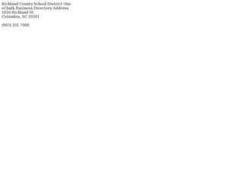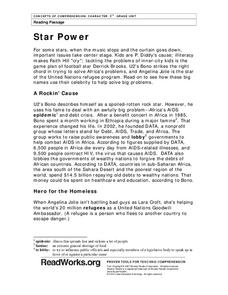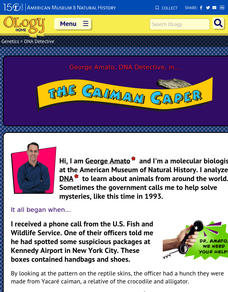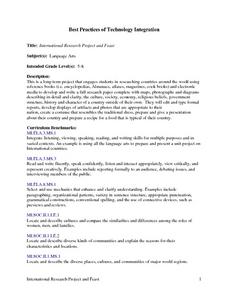Curated OER
A Proper Role for Government - Seeking Perfection in an Imperfect World
Students discuss the proper role of government in the economy. Reviewing the foundations for a market economy to work properly, they decide how to best direct resources to get the most out of them. They distinguish between private and...
School Improvement in Maryland
Political Systems: Advantages and Disadvantages
Every political system has advantages and disadvantages. To gain an understanding of these differences, groups investigate the political system of another country—oligarchy, monarchy, dictatorship, parliamentary—and prepare a...
School Improvement in Maryland
Executive Order
After reading information about Executive Order #9066, class members assume the voice of an 18 year-old Japanese-American born in California and placed in an internment camp. Individuals then craft a letter to President Roosevelt...
US Institute of Peace
Organizations Working for Peace
We're all in this together! Show young scholars that peace is a process and having the support of like-minded people can make it happen. 13th in a series of 15 peace building activities, groups conduct research on a peace organization,...
Curated OER
Empire State-Building
Students explore how empires around the globe have impacted the world in which they have existed. They analyze whether or not the United States is an imperialist nation and create their own empires based on their understanding of empires...
Curated OER
Civilizations of the Ancient Near East
Sixth graders investigate ancient civilizations by creating a research project. In this world history lesson, 6th graders investigate historic civilizations developed close to important rivers of the near East. Students...
Curated OER
Greek Governments Comparison
In this World History activity, students compare and contrast five different Greek Government systems in a chart. They identify who ruled each type of government. In addition to, students list the characteristics and weaknesses of each...
Deliberating in a Democracy
Cloning
Students explore the issues and challenges of cloning. In this cloning lesson plan, students read about how cloning affects people and the types of cloning, then they prepare a debate either for or against cloning.
Curated OER
TB - Lusitania Day (1916)
Young scholars, after brainstorming all the different types of propaganda, explore, analyze and study the nature, origin and purpose of propaganda and how its aims are achieved. They assess how the sinking of the Lusitania was...
Curated OER
Memorandum Regarding the Enlistment of Navajo Indians
Learners examine the Navajo dictionary used by the U.S. military in W.W. II. They role-play Navajo messengers and Marine Corp staff. They research the Battle of Iwo Jima and confirm or discount the claim that Navajos made the victory...
Curated OER
The Language of Human Rights
Did you know that there are 15.2 million refugees in the world? High schoolers will read "The Universal Declaration of Human Rights" and learn how they can get involved to lower this surprising number. To really encourage involvement,...
Curated OER
The Art of Protesting
Young scholars view various images to examine different types of protest Americans have used throughout history, and explore ways in which protest can produce change for better or worse.
Reading Through History
Anti-Federalist Paper No. 3
Who were the Anti-Federalists and what do primary sources tell young historians about their beliefs? Learners read Paper No. 3 to understand their values in relation to government, such as their discussion on foreign policy and the pros...
National Endowment for the Humanities
Revolution '67, Lesson 2: What Happened in July 1967? How Do We Know?
Even in a world in which dozens of participants and curious onlookers record every controversial event, the basic facts of what happened are often in dispute. Revolution '67, Lesson 2 explores 1967 Newark, New Jersey using an examination...
Curated OER
Missing Macroinvertebrates - Stream Side Science
Field study groups collect samples of stream water and identify the macroinvertebrates found. Using their data, they calculate a water quality index to rate the health of the stream. They graph their data and discuss the value of a water...
Curated OER
Latin America and United States Policy Today
High schoolers compare the situation of Latin American immigrants with the situation of immigrants from other areas of the world. They use media to obtain information on topics of academic interest, personal interest, and intellectual...
Read Works
Star Power
Angelina Jolie, Bono, and P. Diddy all have something in common: they use their fame to contribute to society in such a way that makes the world a better place. After reading a three-page passage on the types of causes to...
Skyscraper Museum
Changes in a City Over Time
Investigate the growth and development of New York City with the final lesson in this four-part series on skyscrapers. Learners first explore the concept of urban growth by looking closely at a series of three paintings made of Wall...
American Museum of Natural History
DNA Detective
Match up the DNA code. Pupils read the website from the American Museum of Natural History about how DNA can determine whether a skin is from a particular type of reptile. Using the same technique, learners match up products with the...
Curated OER
A Date Which Will Live in Infamy
High schoolers analyze Franklin D. Roosevelt's "Day of Infamy" War Address. Students read the original first typed draft of the speech, and compare handwritten changes with the original to determine whether the changes strengthened or...
Curated OER
Dictatorship
Fifth graders research world history by researching democracy. In this dictatorship lesson plan, 5th graders read the story "The Composition" and identify a list of former dictators on the Internet. Students define several key terms and...
Curated OER
Hey, Mom! What's for Breakfast?
Students examine how he world eats breakfast. In this food choices lesson, students work in groups to list breakfast foods and their ingredients and find goods and consumers on the list. The, students use the Internet to complete a...
Curated OER
International Research Project and Feast
Students research countries around the world. They develop and write a research paper that includes maps, photographs, and diagrams. They describe the culture, society, economy, religious beliefs, government structure, and history of...
Curated OER
Limits of Power
Learners examine the importance of limiting power in governments. In this government lesson, students investigate the importance of placing limits on government by looking at the US Constitution. They look at ways that being an active...

























